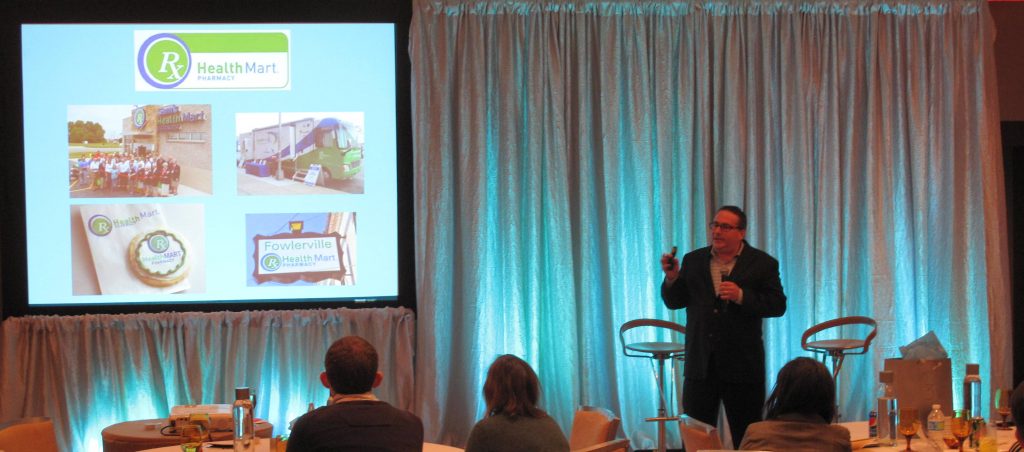
 Midway through his presentation at Aligned, Evan Hackel led a demonstration that no one who was in the room will forget anytime soon. He led Andrew Glenn, one of Promoboxx’s Brand Account Managers, out of the room. Evan then returned to the room, where he posted three archery-style targets at different locations on the walls and assigned a different team of people to each of them. He explained that he was going to put a blindfold on Andrew and bring him back into the room. When he did, each team’s job would be to get Andrew to go to its target. Evan explained that the teams could use any strategy to get Andrew to go up to its target. The only thing they could not do was to touch Andrew.
Midway through his presentation at Aligned, Evan Hackel led a demonstration that no one who was in the room will forget anytime soon. He led Andrew Glenn, one of Promoboxx’s Brand Account Managers, out of the room. Evan then returned to the room, where he posted three archery-style targets at different locations on the walls and assigned a different team of people to each of them. He explained that he was going to put a blindfold on Andrew and bring him back into the room. When he did, each team’s job would be to get Andrew to go to its target. Evan explained that the teams could use any strategy to get Andrew to go up to its target. The only thing they could not do was to touch Andrew.
When Evan led Andrew back into the room and turned him loose, each team tried different approaches to direct Andrew to its target. Some people stood close to Andrew and shouted “Turn right . . . turn left . . . take a step forward!” Other people stood by their team’s target and yelled, “Come toward the sound of my voice!” Other people just surrounded Andrew and yelled at him. He later described the experience as “terrifying.”
Andrew never did reach any of the targets, but Evan had proven his point . . .
Marketers have a hard time communicating with their retailers and getting them to do what they want them to do . . . and it takes strategy, not chaos, to achieve results with retailers today.
At the start of his presentation, Evan showed two film clips of freestyle skiers competing for medals. His first video showed a legendary skier named Bob Crossman executing a flawless run to win the 1975 Freestyle World Championships in Snowbird, Utah, “With an absolutely fabulous run,” Evan observed, and we all agreed.
“That was the state of the art for freestyle skiing in 1975,” Evan said. He then showed a video of a phenomenal 17-year-old skier (who happens to be Evan’s son) in a recent competition where he completed a “triple 10” jump that is one of the hardest in the world. “But what in the world does this have to do with Aligned?” Evan asked. “What in the world does this have to do with retail?
“I wanted to show you these videos because they tell us that if you want to be successful, you have to keep going up a notch. When you think about retail in 1975 – and I was born into a retail business – retail was a piece of cake. I was a GE dealer, among other things. If you were aligned with those companies, put ads in the local newspaper, you were in business. But where is retail today? With all the wholesalers out there, all the dotcoms, all the malls, all the marketing, all the places people can shop, it is incredibly difficult to be successful today.”
Evan then asked us to think about the year 2040.
“Now, where are we going to be then?” he asked. “I can tell you this right now, 2040 is not very far away. For you and your retailers to be successful then, you’re constantly going to have to work together, constantly going to have to push the edge, so you can make others successful and make yourself successful. What worked yesterday won’t work tomorrow.
“I want to go back to 1974, when there were probably between 200 and 300 carpet mills in this country. Massive. And none of them had more than 3% or 4% of the carpet market. Yet Mohawk came up with a very simple idea – a program called Color Center. If you had a carpet store, Mohawk was going to give you a differentiated design, differentiated branding on your product, and was going to help you sell more floor covering. Retailers loved it that, and Mohawk sold more carpet than ever before.
“Moving forward to today, Mohawk has a program called FloorScapes, and this is the difference. Back in 1974, it was all about presenting products on the floor. Today it’s about training, marketing, processing credit cards, doing consumer credit, and much more. Today, manufacturers have to say to retailers, `What else can we do for you? We will make it real easy. We will come in to redesign your store. We will come help set up displays. We are going to do everything we can to make you a better retailer. And you’ll be hugely successful.`”
“Mohawk and Shaw are the two mills that have most strongly supported independent retailers,” Evan summarized. “Those two are the two largest carpet mills today. If you combine them, they represent probably between 75% and 80% of all carpet manufacturing in our country today. Instead of there being between 200 and 300 mills as there were in 1975, there are probably about 10 today, depending on what you would consider a real mill. It was the commitment that Mohawk and Shaw made to retailers that made the difference for them.”
Evan then shifted gears and presented a case study about Health Mart, a national brand of healthcare products distributed by McKesson Pharmacy Systems.
“Have you heard of them?” Evan asked. “They do $140 billion in business each year. CVS is something like a $125 billion company and huge companies like that have such buying power they can go to a distributor like McKesson and they can squeeze every penny of profit out of their businesses. And if they want, CVS, Walgreens, and other big chains could go right to a manufacturer and say, `We’ll distribute this product ourselves.’
“McKesson realized that their best customers were independent retailers, yet they were closing down and losing out to the big chains. But if McKesson could invest in independent retailers, they could prevent that from happening. And today, they have 3,500 retailers using the Health Mart brand in various shapes and sizes. They help individual retailers with education, marketing, and they teach their retailers how to be better businesses.”
“If all McKesson said was, `Here, take my product,’ would that help that retailer build its business? No! No, they have to help the retailer be more successful. Helping a store market a product more efficiently and effectively makes all the difference in the world.”
“We have retailers out there who have blinders on,” Evan said, “they don’t want to change because they have always `done it this way.’ And that is not a good long-term strategy for success.
“You have to ask, what do retailers want? They want customers. They want profitable sales. They want to be the only people in the world who have your product. (The concept that in this day and age someone is going to have an exclusive, let’s face it, is not a reality.)
“They really need marketing tools, merchandising systems, and operational excellence. Part of what we have to do is to help retailers understand what they need and help them get those things.”
Evan’s talk was coming to a close, but we were excited to hear his closing comments.
“So going back to the second skier – and by the way, he is my son – his success was not just him. It is due to his coach and many other people who worked hard to make him the skier that he has become. It took all those people working together. That’s the concept of alignment. It is you working and partnering with your retailers, and it is your retailers partnering with each other. All of them can be a team that can be successful.”
Evan provides management consulting services for franchises, cooperatives, buying groups and dealer networks. He works with leading organizations including Denny’s, Dairy Queen and Meineke, to name a few. He understands the keys to success of a strong dealer network are successful retailers that have partners to empower them to grow and be more profitable. Contact Evan directly at ehackel@ingage.net.
